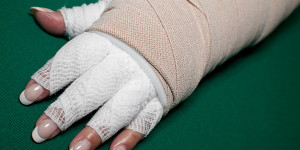Acupuncture as a Treatment for Lymphedema
Last month, we focused on how acupuncture can effectively treat the symptoms of chemotherapy-related ___________. This month, I’m going to be talking all about lymphedema.
What is lymphedema?
If you know anyone whose arms or legs have swelled up after chemo, you’ve seen lymphedema in action. It’s caused by a buildup of lymph fluid in nodes that have been damaged by cancer treatment. Improper drainage of lymph fluid causes this swelling and drastic growth of the limbs. lymphedema is a serious problem that makes it harder to do just about everything we normally take for granted. It can make even simple tasks, like putting on pants and shoes, very difficult.
lymphedema can lead to other problems, like skin blisters and bacterial infections, and infected lymph vessels, called lymphangitis. Left unchecked, serious cases of lymphedema can even lead to lymphangiosarcoma, a rare form of soft tissue cancer.
There is no cure for lymphedema. In fact, there isn’t even a drug that can reduce swelling. Modern treatments call for exercise regimens, massages, arm and leg wraps, and compression wear. The most widely accepted treatment is complete decongestive therapy (CDT), a two-phase program in which patients visit a doctor for lymph drainage and therapeutic exercises, and then learn to use a pneumatic compression pump at home to perform manual lymph drainage (MLD).
How an ancient therapy like acupuncture can help
Fortunately, acupuncture has been documented several times in medical literature as an alternative treatment for cancer-related lymphedema. It has been shown to relieve the symptoms of lymphadema in breast cancer patients, and can even reduce the size of swollen limbs.
While it is unclear how acupuncture does this, it seems that a likely answer can be found in its stimulation of the peripheral nervous system (PNS). Through local tissue release and PNS stimulation, acupuncture has been shown to increase local tissue levels of various biological triggers, including endogenous opioids, anti-inflammatory cytokines and neuropeptides. Since inflammation, tissue pressure, and the presence of accumulating toxins, free radicals, and dead cells all contribute to lymphedema, this theory isn’t too farfetched.
Next week, I’ll explain how acupuncture has been shown to specifically help with lymphedema in breast cancer patients. Stay tuned!



